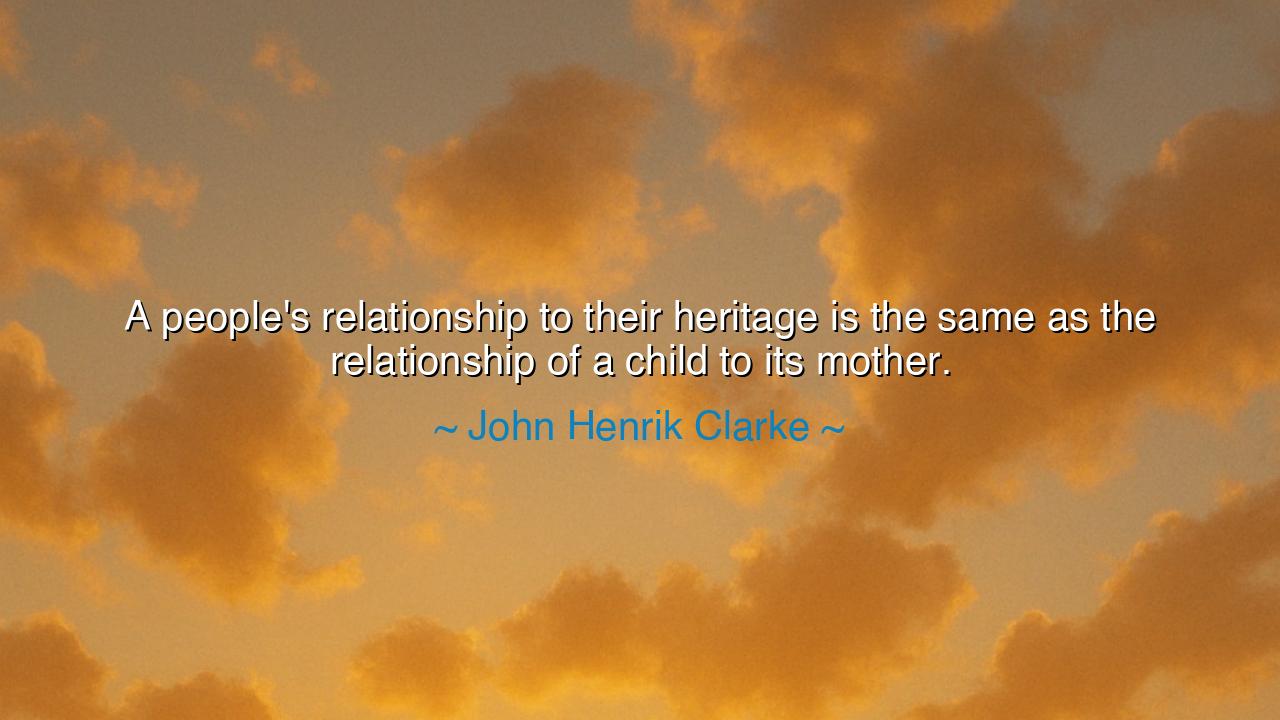
A people's relationship to their heritage is the same as the
A people's relationship to their heritage is the same as the relationship of a child to its mother.






The words of John Henrik Clarke—“A people’s relationship to their heritage is the same as the relationship of a child to its mother”—resound with the deep echo of ancestral wisdom. They remind us that identity and survival are bound not merely to the present moment, but to the roots from which we spring. Just as the child draws nourishment, comfort, and guidance from its mother, so too do nations and cultures draw strength and direction from their heritage.
The ancients knew this truth in their bones. They preserved myths, songs, and sacred stories, not as idle tales, but as the living voice of the ancestors. To sever a people from their heritage was to orphan them, to leave them wandering without memory or guide. Clarke speaks to this eternal bond, declaring that just as no child thrives without the care of its mother, no people can flourish when cut off from the wisdom and traditions of their past.
This truth is both nurturing and heroic. For heritage is not only comfort; it is also responsibility. It calls each generation to honor those who came before, to learn from their victories and failures, and to carry forward the sacred flame. To forget is to weaken; to remember is to strengthen. The ancients would have called this duty piety, not in narrow ritual, but in reverence for the lineage that gave us life.
Yet Clarke’s words also carry warning. A child estranged from its mother suffers confusion, sorrow, and loss. Likewise, a people alienated from its heritage suffers spiritual amnesia, no longer knowing who they are or why they exist. In such estrangement lies vulnerability, for without roots, a tree cannot stand against the storm.
So let this teaching endure: cling to your heritage as a child clings to its mother, with gratitude and with awe. Drink deeply of its wisdom, honor its struggles, and carry it proudly into the future. For in the embrace of the past lies the strength of the present and the hope of tomorrow. As the ancients taught and Clarke reminds us, to know where you come from is the first step toward knowing who you are—and who you may yet become.






TYnguyen tran yen
This quote by John Henrik Clarke really resonates with the importance of understanding and respecting one’s heritage. A mother provides the foundation for a child’s growth, and similarly, heritage shapes a community’s identity. But how do we reconcile the tension between moving forward and preserving the past? Is it possible to respect and celebrate our heritage while adapting to the modern world?
NNThao Nhi Nguyen
Clarke’s view on heritage and its deep connection to a child’s relationship with a mother makes me wonder about the role of history in shaping our present and future. If heritage is as crucial as a mother’s influence on a child, how do we as individuals and communities nurture that relationship? What practices or rituals help us stay connected to our cultural origins, and why does it matter?
PGAnh Pham Gia
John Henrik Clarke’s analogy between heritage and motherhood is compelling. It raises the question of how we perceive and honor our heritage. Just as a child cannot fully thrive without its mother’s nurturing, can a people truly understand themselves without honoring their roots? In today’s globalized world, are we at risk of losing that connection, and what might be the consequences of such disconnection?
TMnguyen tue man
Clarke’s quote makes me reflect on how much our heritage shapes us. Just as a child’s relationship with their mother forms their identity and sense of belonging, so too does a community’s relationship with its heritage. But how do we ensure that we preserve this relationship? What role does education, culture, and tradition play in maintaining that connection, especially in a rapidly changing world?
LPLinh Phuong
I find Clarke’s comparison between heritage and motherhood both powerful and tender. It implies that heritage is an inseparable part of who we are, just like the bond between a mother and child. But what happens when people feel disconnected from their heritage? Can they still find a sense of belonging, or is a connection to one’s history essential for a complete identity?